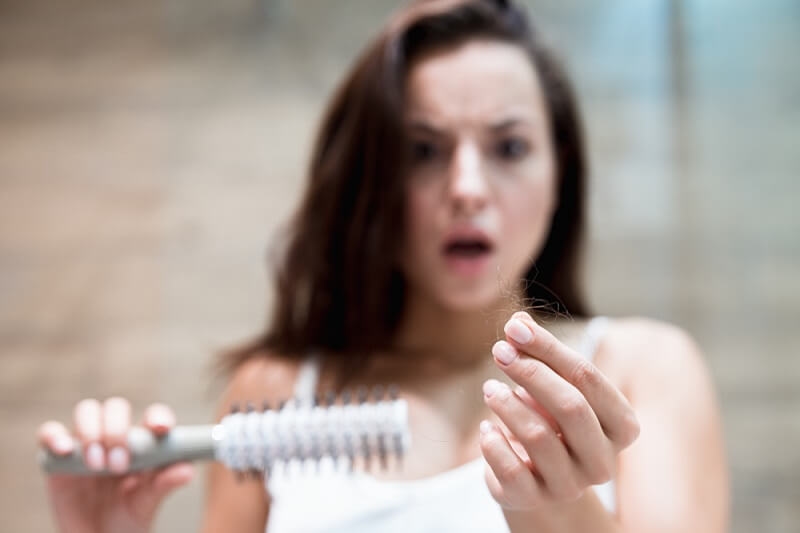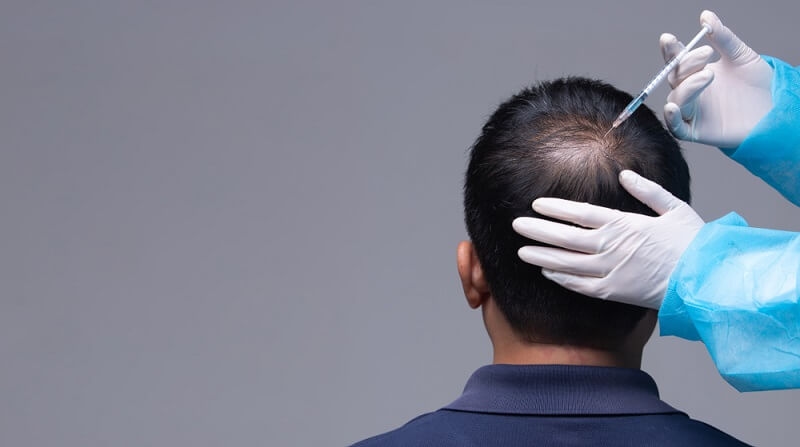
Managing hair loss is arguably one of the most widely discussed topics in health and beauty today. Shedding hair tress in changing of seasons, stress-related hair loss, or nutrient deficiency hair loss; whatever the cause, at some point in time, we all lose hair. Successful hair loss control begins with an awareness of your hair's natural growth pattern and nourishing it appropriately. Within weeks of implementing the proper hair thinning care regimen and regular scalp massage, you can begin to see healthier, fuller hair.
Excessive hair loss not just impacts your looks but also your confidence level. It is normal to lose 50-100 hairs a day, but more hair loss can be a sign to implement effective hair fall control solutions. Appropriate dosages of nutrients, such as biotin, can significantly contribute to restoring vitality and reducing the amount of shedding you would otherwise experience.
Hair fall control isn't simply slapping on random products or home remedies; it is understanding what is happening at the root. Each hair begins its growth in a follicle that undergoes three distinct stages, known as cycle phases: anagen (growth), catagen (transition), and telogen (rest). If your follicles are affected or inactive, you will experience an increase in shedding and a slowing of regrowth.
Things that can decrease your anagen phase include hormonal fluctuations, sleep & nourishment, stress, and rough styling methods. An effective hair fall control strategy will strengthen the root, nourish the scalp, and protect your hair from environmental stressors.
Research has shown that key nutrients, such as biotin for hair, zinc, iron, and vitamin D, are essential for maintaining long and healthy hair. Biotin is particularly important in keratin production, the protein that provides thickness and strength to hair. Likewise, consistent massage on the scalp increases blood flow to the follicles, supplying essential oxygen and nutrients for healthy hair growth.
Before identifying some remedies, it's important to uncover the underlying cause of your hair loss. One of the routine factors is:
Once you identify the causative issue, you can adjust your hair loss management program and maximize your efforts.
When caring for hair that is thinning, the biggest consideration is that you will stick to the routine. While hair loss can't be undone in your next shower, you can strengthen the hair you have and encourage more growth by developing daily routines and paying special attention to your hair care.
The following is a list of expert tips on care for thinning hair:
If you incorporate these tips into your everyday hair care routine, you will reduce hair fall and enhance the overall texture and shine of your hair.
One simple yet effective method of managing hair loss is a daily scalp massage.
This ancient practice improves blood circulation, fortifies follicles, and distributes natural oils evenly.
To do a proper scalp massage:
Studies suggest that frequent scalp massage strengthens the hair over time and reduces hair loss by a considerable amount. By combining it with an oil rich with nourishing properties, you add to the results and a required engine to your routine for thinning hair.
Biotin is one of the most important vitamins for hair growth and hair strength of all vitamins. Biotin (vitamin B7) plays a crucial role in helping your body utilize nutrients as energy while stimulating keratin production, the protein essential for healthy, strong hair.
Insufficient biotin can lead to hair thinning, hair dullness, and slow hair regrowth.
For best results, consider adding foods that are high in biotin to your diet, like:
Alternatively, one may choose biotin supplements or serums containing this nutrient. Consistently applied, biotin for hair makes follicles stronger, reduces shedding, and maintains overall scalp health.
Adding a serum for hair growth to your regimen can speed up your hair loss control process. The serums utilized active ingredients like peptides (medical-grade types), caffeine, and plant extracts that stimulate the follicles and hydrate the scalp.
Here are some tips for using them:
Pairing a hair growth serum with biotin hair supplements and scalp massage completes your full regimen for healthier, thicker strands.
Natural remedies are a helpful introduction to your hair fall prevention journey and are easy to fit into your weekly self-care routine:
Use these remedies 1–2 times weekly for visible improvement in texture and thickness.
Beyond external care, your lifestyle choices significantly impact hair health. Follow these habits for long-term hair fall control:
In tandem with traditional treatment and a scalp massage, utilizing these techniques and practices will ultimately grow stronger, fuller hair.

In cases of significant thinning or balding spots, specialists have hair loss treatment options known to be effective:
Your best bet is to visit a dermatologist or trichologist to ensure that the most suitable treatment for you and your hair problems is chosen.
There is a lot of misinformation about hair loss and hair regrowth. Let us address a few myths:
Myth 1: Daily washing of hair causes more hair fall.
Reality: Hair sheds daily naturally; shampooing gets rid of loose hair, not the healthy one.
Myth 2: Pattern baldness affects only men.
Truth: Hormonal or genetic thinning can affect women, too.
Myth 3: Cutting your hair regularly helps it grow faster.
Truth: While trimming will help with split ends, it does not help the follicles.
Now that you know the information, you can make informed decisions about your own hair fall control proposal.
A systematic, holistic set of steps is the best approach for hair fall control. You should include the following three important steps:
Implement all of this combination regularly for at least 3 months to see improvements in texture, thickness, and shedding.
Controlling hair loss is not about a quick fix, but it’s about actions you can take consistently, and use patterns that are based on science! This could include weekly scalp massages, supplementation for hair growth (e.g., biotin), or a good hair growth serum. The key is consistency.
Healthy hair is an external representation of internal health, balance (diet, sleep, nutritional patterns, etc.), and good grooming. By putting in the correct effort to your hair and sound knowledge of what your hair actually needs, you can reduce shedding, encourage growth, and restore natural shine and confidence.
This content was created by AI